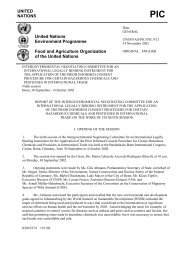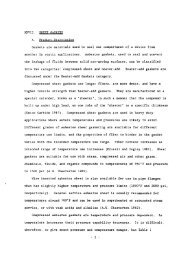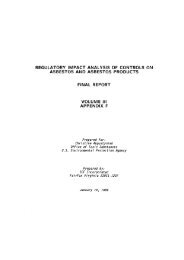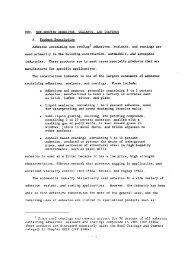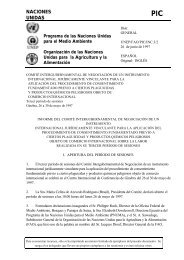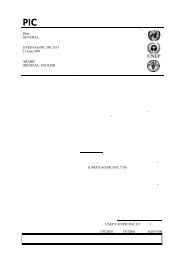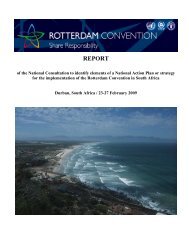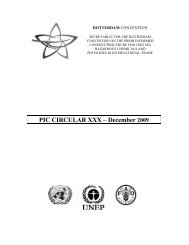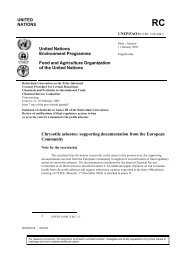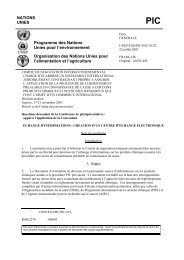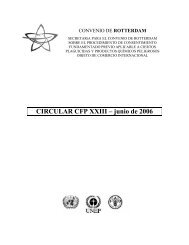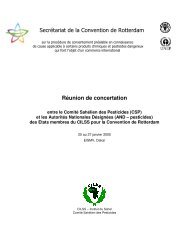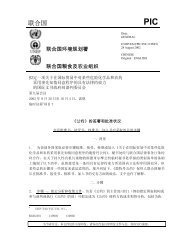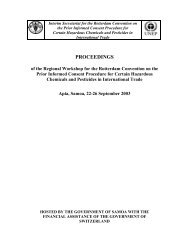Rep o rt of th e tw en - Rotterdam Convention
Rep o rt of th e tw en - Rotterdam Convention
Rep o rt of th e tw en - Rotterdam Convention
You also want an ePaper? Increase the reach of your titles
YUMPU automatically turns print PDFs into web optimized ePapers that Google loves.
PROGRESS IN INTEGRATED PEST MANAGEMENT (IPM)<br />
IN ASIA AND THE PACIFIC REGION<br />
(Ag<strong>en</strong>da Item 8)<br />
81<br />
Annex IV<br />
The delegates <strong>of</strong> <strong>th</strong>e 23 rd Session <strong>of</strong> <strong>th</strong>e APPPC, while reviewing <strong>th</strong>e past effo<strong>rt</strong>s, pointed<br />
out various chall<strong>en</strong>ges for <strong>th</strong>e region:<br />
1. Consumer education on IPM and IPM Produce<br />
2. Premium on crops grown <strong>th</strong>rough IPM practices<br />
3. Policy makers role in creating <strong>en</strong>abling <strong>en</strong>vironm<strong>en</strong>t for IPM <strong>th</strong>rough organizational<br />
and policy suppo<strong>rt</strong><br />
4. Demonstrating FFS-IPM approach as an instrum<strong>en</strong>t <strong>of</strong> Community developm<strong>en</strong>t<br />
5. Developing guidelines for applicability <strong>of</strong> FFS-IPM approach to all main cropping systems<br />
in <strong>th</strong>e depressed ecologies in <strong>th</strong>e region<br />
6. Developing and mobilizing plural suppo<strong>rt</strong> mechanisms for post-FFS farmer groups<br />
7. Fu<strong>rt</strong>her research on <strong>th</strong>e role <strong>of</strong> GMOs in IPM.<br />
Regional and National Programmes <strong>of</strong> <strong>th</strong>e APPPC member countries directed <strong>th</strong>eir effo<strong>rt</strong>s to<br />
realize objectives <strong>th</strong>at meet <strong>th</strong>ese chall<strong>en</strong>ges. FAO-EU Programme for cotton in Asia and FAO<br />
Regional Vegetable Programme.played <strong>th</strong>e key role in <strong>th</strong>ese effo<strong>rt</strong>s.<br />
FAO-EU IPM Programme for Cotton in Asia<br />
During its five-year implem<strong>en</strong>tation <strong>th</strong>at <strong>en</strong>ded in December 2004, <strong>th</strong>e Programme promoted<br />
more ecological production me<strong>th</strong>ods in its member countries, where over 50% <strong>of</strong> <strong>th</strong>e world’s cotton<br />
is grown. The member countries included Bangladesh, China, India, Pakistan, Philippines and<br />
Viet Nam.<br />
Implem<strong>en</strong>ted by FAO wi<strong>th</strong> a total budget <strong>of</strong> 12 million Euro and funded by EU, <strong>th</strong>e programme<br />
was established wi<strong>th</strong> <strong>th</strong>e purpose <strong>of</strong> responding to <strong>th</strong>e needs <strong>of</strong> cotton producing countries to tackle<br />
rising production costs, increasing pollution <strong>of</strong> <strong>th</strong>e <strong>en</strong>vironm<strong>en</strong>t due to excessive pesticide use,<br />
deteriorating heal<strong>th</strong> <strong>of</strong> farmers and increase in pove<strong>rt</strong>y.<br />
The Programme succeeded in showing <strong>th</strong>at farmer education <strong>th</strong>rough <strong>th</strong>e Farmer Field School<br />
(FFS) approach is crucial for <strong>en</strong>couraging more sustainable agricultural production. The FFS approach<br />
was an effective me<strong>th</strong>od <strong>of</strong> empowering and mobilizing farm families and <strong>of</strong> developing <strong>th</strong>e <strong>en</strong>hanced<br />
managem<strong>en</strong>t skills necessary for a sustainable pro-poor and <strong>en</strong>vironm<strong>en</strong>tally-fri<strong>en</strong>dly agricultural<br />
and rural developm<strong>en</strong>t. The experi<strong>en</strong>ces gained from <strong>th</strong>is Programme may b<strong>en</strong>efit many on-going<br />
and future <strong>en</strong>deavors to reduce pove<strong>rt</strong>y and conserve precious natural resources.<br />
Of its six member countries, <strong>th</strong>e Programme most likely left a sustainable impact in India,<br />
Pakistan, and China.<br />
In India, it had a remarkable impact in <strong>th</strong>e States <strong>of</strong> Karnataka and Maharashtra where FFSs<br />
were recognized as <strong>th</strong>e model for governm<strong>en</strong>t-farmer interaction, and state funds are allocated to<br />
continue and expand project activities. In Pakistan, al<strong>th</strong>ough <strong>th</strong>e country did not have previous



